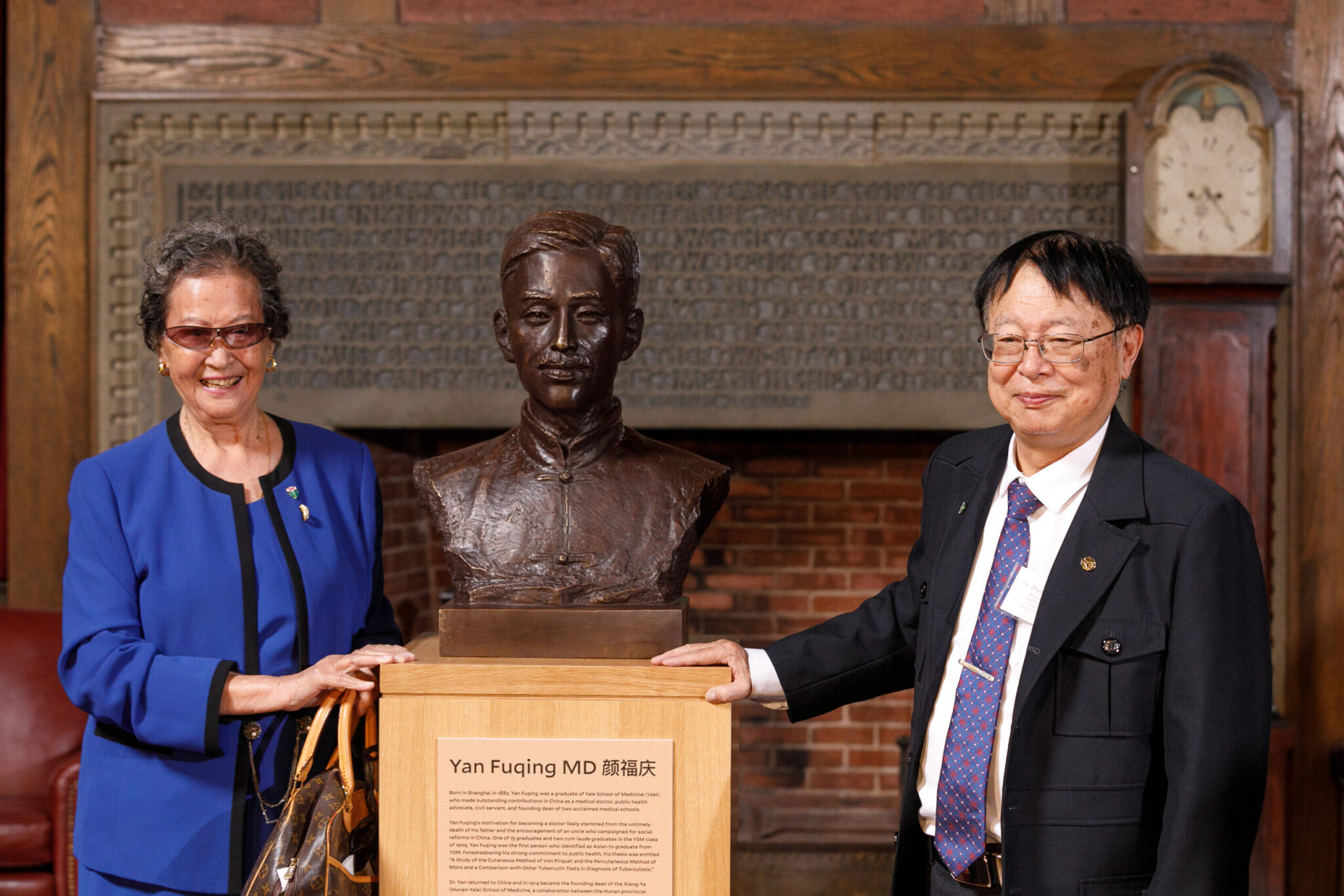School of Medicine honors Yan Fuqing, celebrates continued bilateral relations with Chinese medical institutions
Yan, the first Asian person to receive a medical degree from Yale, went on to pioneer public health initiatives in China and leave a legacy of cultural and intellectual exchange between Yale and peer Chinese institutions.

Courtesy of Anthony DeCarlo
Dr. Yan Fuqing, who became the first Asian person to receive a doctorate of medicine at the Yale School of Medicine when he graduated in 1909, was honored with a new statue on Wednesday.
The School of Medicine unveiled a bust of Yan, gifted by his grandchildren — Doreen Chen and Yan Zhiyuan, also doctors — at the Medical Historical Library within the Harvey Cushing/John Hay Whitney Medical Library building. The first half of the event featured a series of academic lectures that detailed Yan’s accomplishments, while the second half included remarks from the event organizers and Yan’s grandchildren. The event also had live translators to interpret between Mandarin Chinese and English.
“Dr. Yan Fuqing was a medical practitioner, a public health advocate, a civil servant and educator,” Nancy Brown ’81, dean of the Yale School of Medicine, said at the unveiling. “But he was also a visionary. He created a bridge between the United States and China for medical professionals.”
After graduating from the School of Medicine, Yan Fuqing later oversaw the Hunan-Yale Agreement, a program that established exchanges of English instructors and medical personnel between the Yale-China Association — formerly Yale-in-China — and Hunan Medical College. Yan also helped found the Shanghai Medical College at Fudan University and Xiangya School of Medicine at Central South University.
At the event, Yan Fuqing’s grandchildren spoke of his inspirational character in addition to his academic achievements.
“Grandpa brought Yale’s motto of ‘educate and nurture creative leaders in medicine and science’ to his motherland,” Chen said in her remarks. “He cultivated his passion and willingness to serve in his students as well, which led to many of them becoming leading experts in the medical field of China.”
Beyond his medical accomplishments in China, Nancy Chapman ’77, trustee of the Yale-China Association, and other administrators celebrated Dr. Yan’s legacy and how he has inspired long-standing bilateral relations between Yale, Fudan University and Central South University. Qin Guowen, the vice governor of Hunan, and Gary Locke, former U.S. ambassador to China, also attended the event.
Locke, in particular, emphasized the importance of these bilateral relations to the future of medicine.
“Cultural exchange is so important because if we’re going to solve some of the difficult issues between nations on behalf of the world, we need to have a better understanding of each other’s perspectives, viewpoints, culture, history,” Locke said. “The world is expecting leadership from the United States and China. The United States can’t do it alone. China can’t do it alone.”
While experts say the geopolitical relationship between China and the United States remains tense, Qin Yan, a professor of pathology at the medical school and president of the Asian Faculty Association at Yale, expressed hope that local relations between cities such as New Haven and Changsha — which established a sister-city relationship in 2018 — would pave the way for more large-scale exchanges of innovation and medical advances.
“We still have major concerns over the ability to collaborate with Chinese or other foreign institutions,” Yan wrote in an email to the News. “We hope that local and institutional collaborations could relieve some of the concerns. It would be easier if we could collaborate under a master institutional agreement.”
According to Brown, prior to the COVID-19 pandemic, up to 10 percent of graduating medical students from Yale completed a clinical rotation at Xiangya School of Medicine. Faculty such as Yan also mentor postdoctoral trainees who graduated from the two Chinese institutions that Yan himself helped to establish.
For Yan, the event also marks a positive trajectory in representation for Asian and Asian American faculty at Yale.
“This event and the strong launch of [the Asian Faculty Association at Yale] definitely increased visibility of Asian faculty,” Qin Yan wrote. “The support from the university and medical school DEI offices are strong, but there is a lot to be done to increase the representation of Asian faculty in the leadership roles.”
The Yale-China Association was founded in 1901.







